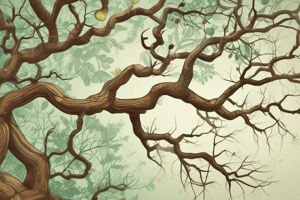Podcast
Questions and Answers
What is the main focus of the study of microbiology?
What is the main focus of the study of microbiology?
- The structure and function of plants
- The behavior and evolution of animals
- The study of microorganisms, such as bacteria, viruses, and other microbes (correct)
- The interactions between organisms and their environment
What is the term for the process by which a new species emerges from an existing one?
What is the term for the process by which a new species emerges from an existing one?
- Mitosis
- Speciation (correct)
- Natural selection
- Genetic variation
What is the main function of carbohydrates in cells?
What is the main function of carbohydrates in cells?
- To provide energy for cells (correct)
- To perform structural roles
- To contain genetic information
- To provide energy storage
Flashcards are hidden until you start studying
Study Notes
Branches of Biology
- Botany: study of plants, including their structure, growth, evolution, classification, and distribution
- Zoology: study of animals, including their structure, behavior, evolution, classification, and distribution
- Microbiology: study of microorganisms, such as bacteria, viruses, and other microbes
- Ecology: study of the interactions between organisms and their environment
- Genetics: study of heredity, genes, and genetic variation
- Biochemistry: study of the chemical processes that occur within living organisms
- Biophysics: study of the physical principles underlying biological processes
- Molecular Biology: study of the structure and function of biological molecules, such as DNA and proteins
Cell Biology
- A cell is the basic unit of life, consisting of a nucleus, cytoplasm, and cell membrane
- Cellular organelles: specialized structures within cells that perform specific functions, such as mitochondria (energy production) and ribosomes (protein synthesis)
- Cell division: process by which cells reproduce, including mitosis (somatic cells) and meiosis (gametes)
Evolution
- Theory of evolution: all species share a common ancestor and have evolved over time through natural selection and genetic variation
- Natural selection: process by which individuals with favorable traits are more likely to survive and reproduce, leading to adaptation and speciation
- Speciation: process by which a new species emerges from an existing one
Biological Molecules
- Carbohydrates: provide energy for cells, examples include glucose and cellulose
- Proteins: perform a wide range of functions, including structural, enzymatic, and transport roles
- Lipids: provide energy storage and play a role in cellular structure, examples include fats and oils
- Nucleic acids: contain genetic information, examples include DNA and RNA
Ecosystems
- Ecosystem: community of living organisms and their environment, interacting through energy flow and nutrient cycling
- Food chain: sequence of organisms that eat other organisms, with energy flowing from one level to the next
- Food web: network of interconnected food chains, showing the complex relationships between organisms in an ecosystem
Branches of Biology
- Botany is the study of plants, including their structure, growth, evolution, classification, and distribution.
- Zoology is the study of animals, including their structure, behavior, evolution, classification, and distribution.
- Microbiology is the study of microorganisms, such as bacteria, viruses, and other microbes.
- Ecology is the study of the interactions between organisms and their environment.
- Genetics is the study of heredity, genes, and genetic variation.
- Biochemistry is the study of the chemical processes that occur within living organisms.
- Biophysics is the study of the physical principles underlying biological processes.
- Molecular Biology is the study of the structure and function of biological molecules, such as DNA and proteins.
Cell Biology
- A cell is the basic unit of life, consisting of a nucleus, cytoplasm, and cell membrane.
- Cellular organelles are specialized structures within cells that perform specific functions, such as mitochondria for energy production and ribosomes for protein synthesis.
- Cell division is the process by which cells reproduce, including mitosis for somatic cells and meiosis for gametes.
Evolution
- The theory of evolution states that all species share a common ancestor and have evolved over time through natural selection and genetic variation.
- Natural selection is the process by which individuals with favorable traits are more likely to survive and reproduce, leading to adaptation and speciation.
- Speciation is the process by which a new species emerges from an existing one.
Biological Molecules
- Carbohydrates provide energy for cells, and examples include glucose and cellulose.
- Proteins perform a wide range of functions, including structural, enzymatic, and transport roles.
- Lipids provide energy storage and play a role in cellular structure, and examples include fats and oils.
- Nucleic acids contain genetic information, and examples include DNA and RNA.
Ecosystems
- An ecosystem is a community of living organisms and their environment, interacting through energy flow and nutrient cycling.
- A food chain is a sequence of organisms that eat other organisms, with energy flowing from one level to the next.
- A food web is a network of interconnected food chains, showing the complex relationships between organisms in an ecosystem.
Studying That Suits You
Use AI to generate personalized quizzes and flashcards to suit your learning preferences.




